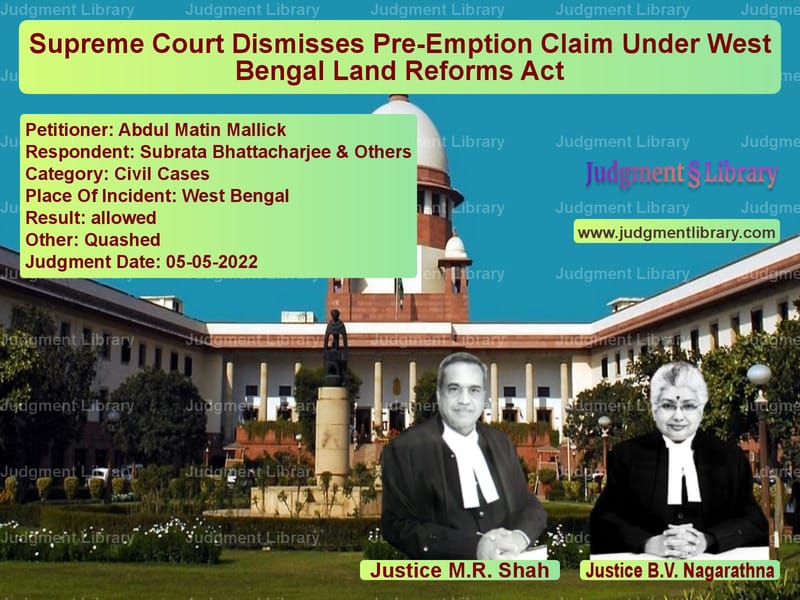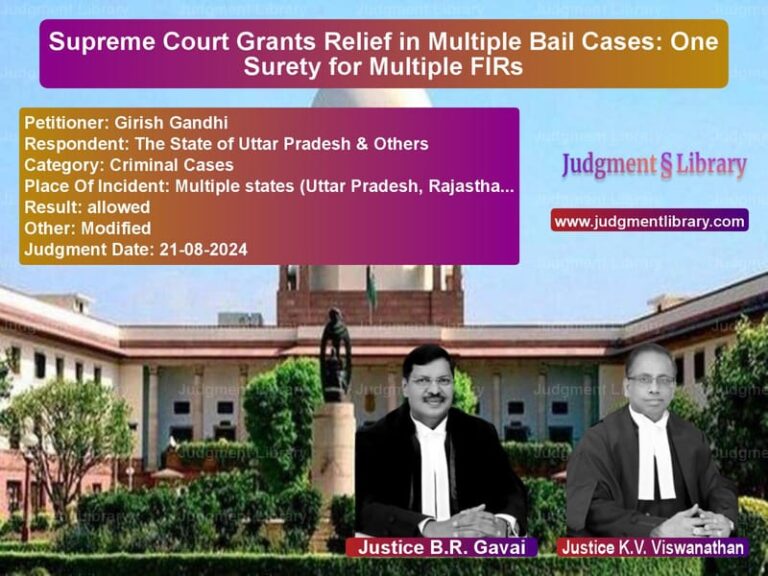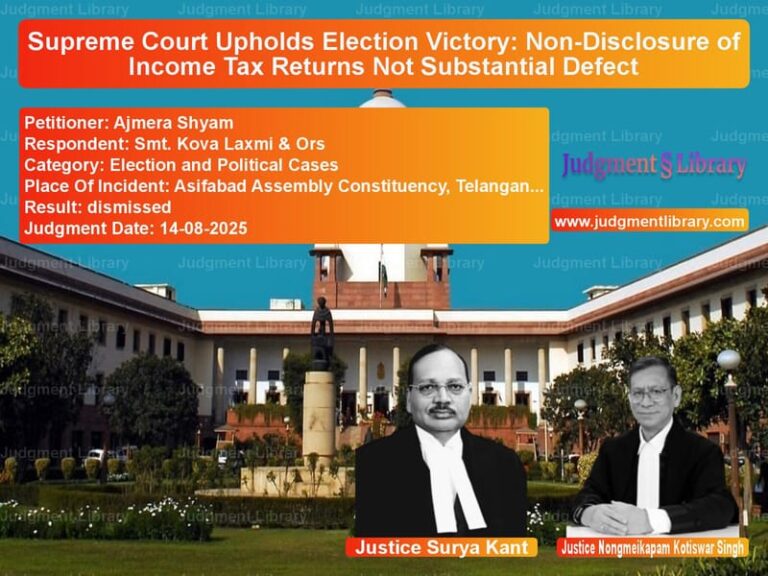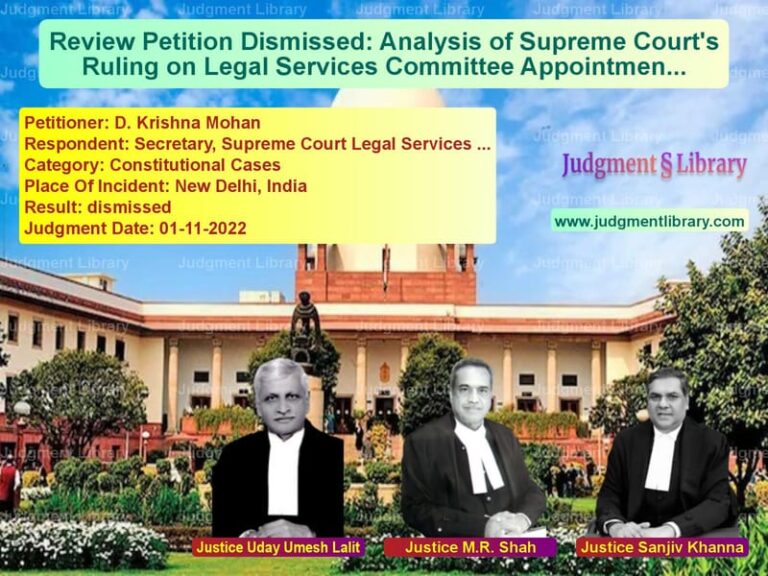Supreme Court Dismisses Pre-Emption Claim Under West Bengal Land Reforms Act
The Supreme Court of India, in Abdul Matin Mallick vs. Subrata Bhattacharjee & Ors., ruled that a pre-emption claim under the West Bengal Land Reforms Act, 1955, is not maintainable if the pre-emptors fail to deposit the entire sale consideration with an additional 10% at the time of filing the application. The judgment emphasizes strict adherence to statutory conditions for exercising pre-emption rights.
Background of the Case
The dispute involved a property initially owned by Khudiram Bhattacharya, who passed away in 2001, leaving his widow and five children—three sons (the pre-emptors) and two daughters. Upon their mother’s passing, the heirs inherited equal shares in the property. The daughters later sold their undivided 2/5th share to the appellant, Abdul Matin Mallick, through a registered sale deed dated 23.11.2011.
The three sons challenged the sale, arguing that they were entitled to pre-empt the transaction under Section 8 of the West Bengal Land Reforms Act, 1955. Their claim was based on the contention that the sale had been executed without serving statutory notice under Section 5(5) of the Act.
Key Legal Issues
- Whether the pre-emption application was maintainable under Section 8 of the West Bengal Land Reforms Act.
- Whether failure to deposit the entire sale consideration along with an additional 10% invalidated the claim.
- Whether the High Court erred in allowing the pre-emption despite non-compliance with statutory requirements.
Arguments by the Petitioner (Abdul Matin Mallick)
The appellant contended:
- The pre-emptors did not deposit the entire sale consideration with an additional 10%, as required by Section 8, rendering the application non-maintainable.
- The High Court’s decision to permit the pre-emptors to deposit the amount at a later stage contradicted Supreme Court precedents.
- As per Barasat Eye Hospital vs. Kaustabh Mondal (2019) 19 SCC 767, pre-emption rights must be exercised strictly per statutory provisions.
- The pre-emption claim was made in bad faith to obstruct the lawful transfer of property.
Counterarguments by the Respondents (Pre-emptors)
The pre-emptors argued:
- The sale consideration stated in the deed was inflated, justifying their initial partial deposit.
- The High Court rightly allowed them to deposit the balance amount during the proceedings.
- The pre-emption right should be liberally construed to protect co-sharers’ interests.
- As per Naymul Haque vs. Allauddin Sk., even if a co-sharer sells their entire share, pre-emption rights remain valid.
Supreme Court’s Observations
1. Strict Compliance with Statutory Requirements
“Deposit of the entire sale consideration with an additional 10% is a mandatory pre-condition for exercising pre-emption rights under Section 8 of the Act, 1955.”
The Court ruled that failure to meet this condition rendered the application non-maintainable.
2. High Court Erred in Allowing Delayed Deposit
“The High Court’s decision to permit late deposit goes against the statutory scheme and Supreme Court precedent.”
The Court cited Barasat Eye Hospital and held that pre-emption rights are weak and cannot be enforced without strict adherence to legal provisions.
3. Pre-Emption is a Weak Right
“The right of pre-emption is not a right to the thing sold but a right to the offer of a thing about to be sold. It is a weak right and must be exercised strictly within the legal framework.”
The Court reaffirmed the limited scope of pre-emption, emphasizing that it should not be used as an obstructionist tool.
Final Judgment
The Supreme Court ruled:
- The High Court’s decision was quashed and set aside.
- The pre-emption application was dismissed due to non-compliance with Section 8.
- The respondents were allowed to withdraw any deposited amounts.
Impact of the Judgment
This ruling has significant implications:
- Strict Compliance with Pre-Emption Laws: Reinforces that procedural lapses render pre-emption claims invalid.
- Prevention of Misuse: Prevents pre-emption from being used as a tool to stall genuine property transactions.
- Strengthened Property Rights: Protects property buyers from unnecessary legal challenges.
- Judicial Clarity: Establishes a binding precedent on mandatory deposits in pre-emption cases.
The Supreme Court’s decision reinforces the principle that pre-emption is a statutory right, not an automatic privilege, and must be exercised within strict legal confines.
Petitioner Name: Abdul Matin Mallick.Respondent Name: Subrata Bhattacharjee & Others.Judgment By: Justice M.R. Shah, Justice B.V. Nagarathna.Place Of Incident: West Bengal.Judgment Date: 05-05-2022.
Don’t miss out on the full details! Download the complete judgment in PDF format below and gain valuable insights instantly!
Download Judgment: abdul-matin-mallick-vs-subrata-bhattacharje-supreme-court-of-india-judgment-dated-05-05-2022.pdf
Directly Download Judgment: Directly download this Judgment
See all petitions in Property Disputes
See all petitions in Specific Performance
See all petitions in Damages and Compensation
See all petitions in Judgment by Mukeshkumar Rasikbhai Shah
See all petitions in Judgment by B.V. Nagarathna
See all petitions in allowed
See all petitions in Quashed
See all petitions in supreme court of India judgments May 2022
See all petitions in 2022 judgments
See all posts in Civil Cases Category
See all allowed petitions in Civil Cases Category
See all Dismissed petitions in Civil Cases Category
See all partially allowed petitions in Civil Cases Category







